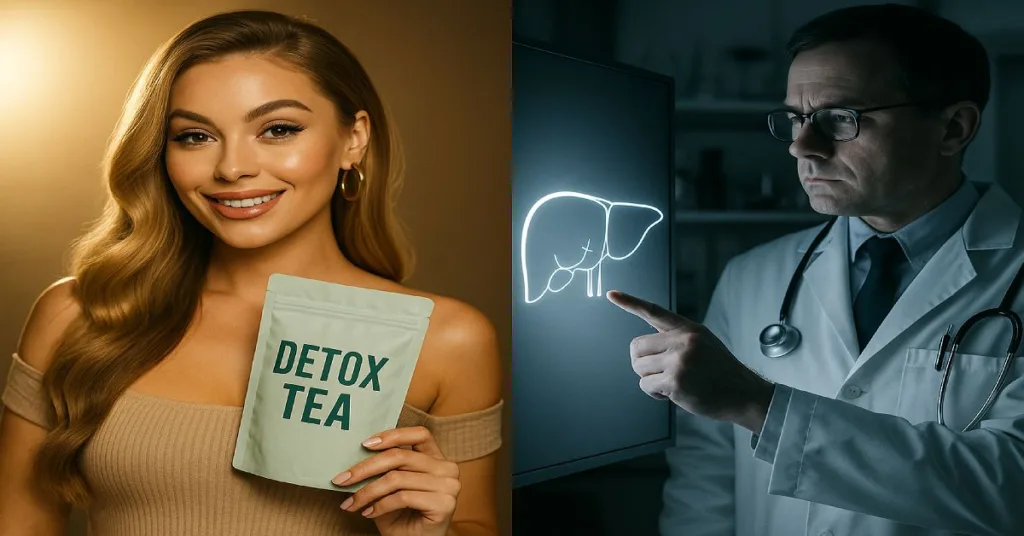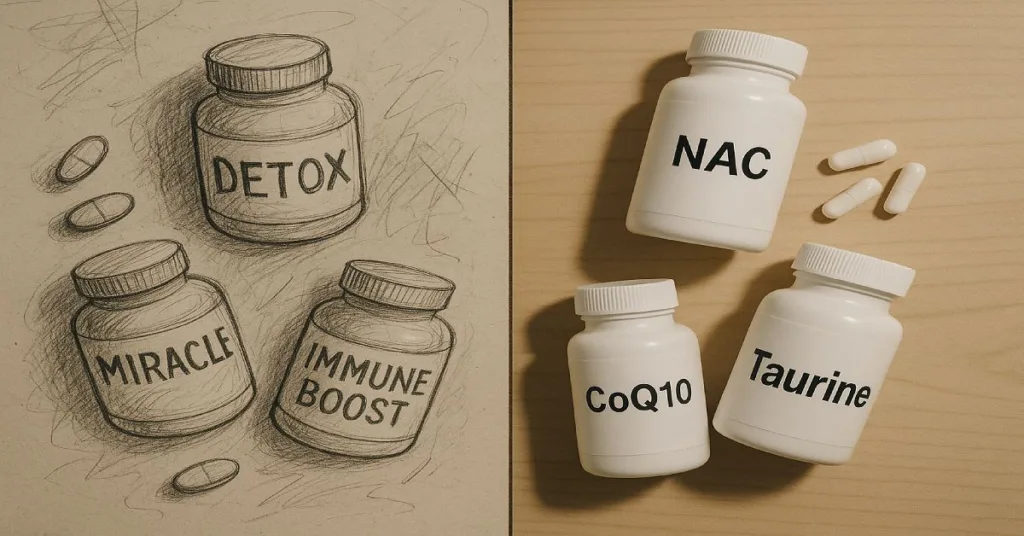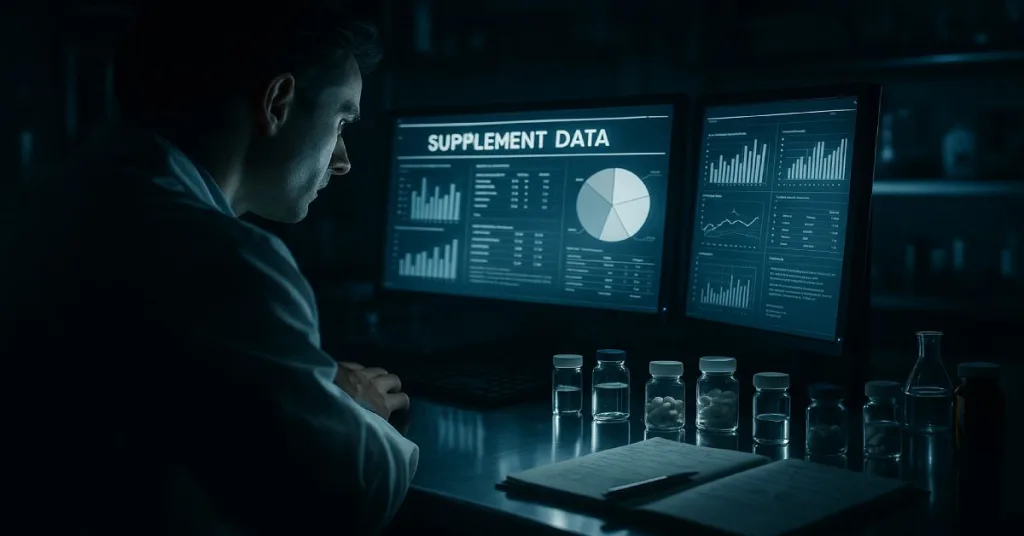Every year, the internet rebrands the same old scams. “Natural detox.” “Miracle cure.” “One pill to fix everything.”
It’s the same snake oil — just with cleaner labels, prettier influencers, and “studies” no one bothers to read.
The supplement world has exploded since 2020, but so has the garbage. And despite endless fact-checks and YouTube debunks, millions of people still fall for dangerous claims that sound scientific but collapse under the slightest scrutiny.
Welcome to the 2025 update of the biggest supplement lies still being pushed online — and what actually works instead.
WhatSuppWorks may earn commissions on recommended products at no extra cost to you. We only promote supplements supported by verified research.
The Business of Health Deception
Scroll through social media for five minutes and you’ll see it:
A “wellness guru” with glowing skin, holding a pastel drink that promises to “cleanse your liver and reset your gut.”
Behind that post is an entire machine — affiliate programs, multi-level marketing, fake clinical graphics, and sponsored content disguised as advice.
Influencers don’t need proof. They just need engagement. Every like, comment, and “where can I buy this?” means more commission and more traffic to a product page built on half-truths.
And the worst part? Even Amazon’s top sellers aren’t immune.
Hundreds of so-called “natural” supplements rise to the top through review manipulation, AI-generated descriptions, and bold health claims that quietly break FDA rules.

The Top 5 Lies Still Circulating Online (2025 Update)
1. “Detox Supplements Cleanse Your Liver”
This one refuses to die.
You don’t need a “detox.” That’s literally what your liver and kidneys do every second you’re alive.
Most detox powders and teas contain diuretics, laxatives, or caffeine, giving the illusion of cleansing when you’re just dehydrated. Some can even cause electrolyte imbalances and fatigue — the exact opposite of “feeling lighter.”
What actually helps: nutrients that support your liver’s natural detox pathways, not fake cleanses.
- N-Acetyl Cysteine (NAC) supports glutathione production, the body’s most powerful antioxidant.
- Milk Thistle Extract (silymarin) has real studies behind its liver-protective effects.
2. “Mega-Dose Vitamin D Is Safe for Everyone”
A decade ago, Vitamin D deficiency was the crisis. Now, it’s the overcorrection.
Social media “biohackers” push 10,000–20,000 IU doses as if it’s a universal fix. But Vitamin D is fat-soluble, meaning it builds up. Too much can spike calcium levels, strain the kidneys, and trigger heart arrhythmias.
Bloodwork matters — most people need 1,000–2,000 IU daily, sometimes less if they get sunlight. The people telling you “the higher, the better” aren’t reading labs. They’re selling bottles.
What actually helps: pair Vitamin D3 with K2 (MK-7) to guide calcium to your bones, not your arteries.
3. “Natural Means Safe”
It’s one of the most dangerous assumptions in the wellness world.
“Natural” doesn’t mean safe — arsenic, belladonna, and hemlock are all natural. Many herbal products interact with common prescriptions:
- St. John’s Wort can reduce the effectiveness of antidepressants.
- Ginkgo can thin blood dangerously when mixed with aspirin.
- Kava and Comfrey have been linked to liver toxicity.
Nature isn’t the problem. Ignorance is. Supplements need the same respect as medications — dosage, quality, and context matter.
What actually helps: reputable brands that use third-party testing, like NOW, Thorne, and Life Extension. They publish certificates of analysis instead of vague “proprietary blends.”

4. “Collagen Erases Wrinkles”
Collagen powders are everywhere — pink tubs, gold scoops, and influencers stirring them into coffee like it’s the fountain of youth.
Reality check: Collagen is a protein, and your body breaks it down during digestion like any other. It doesn’t travel intact to your skin and magically fill lines.
Some small studies show modest benefits, but only when the product contains specific peptide forms and is used long-term. Most people would see the same results from better hydration, adequate protein intake, and antioxidant support.
What actually helps: Vitamin C (for collagen synthesis), CoQ10, and hyaluronic acid supplements with proven absorption data.
5. “Cancer Cure Supplements”
This one isn’t just misleading — it’s lethal.
Every year, desperate patients are targeted by people claiming that high-dose vitamins, herbs, or “frequency drops” can cure cancer. None of these are backed by clinical trials. Many interfere with legitimate treatments, lowering survival rates.
The FDA routinely issues warning letters, but by then, new sites pop up under different names.
What actually helps: discussing any supplement with an oncologist, sticking to evidence-based adjuncts (like turmeric and omega-3s with real clinical data), and avoiding anything that claims to replace medical care.
Why People Still Believe This Stuff
Because when you’re tired, sick, or scared — you want hope.
Most people don’t buy bad supplements out of stupidity. They buy them because the medical system dismissed their symptoms, or because they’re exhausted from trying everything else.
And the internet knows it. Algorithms amplify anything emotional — “I healed myself,” “Doctors don’t want you to know this,” “Big Pharma is hiding the cure.” These narratives feed distrust while quietly moving units.
That’s why exposing lies matters. Not to shame people, but to remind them that truth is still the most effective health strategy.
How to Spot Fake Wellness Claims
You don’t need a PhD to identify bad science — just pattern recognition.
Red flags to watch for:
- “Doctor approved” without naming the doctor.
- No ingredient list or vague “proprietary blend.”
- Reliance on testimonials instead of studies.
- “Clinically tested” with no citation link.
- Every claim ends with “You won’t believe what happened next.”
A trustworthy brand is transparent. It lists ingredients, dosage, and third-party testing right on the label — because it has nothing to hide.

What Actually Works — Real Supplements, Real Science
Here’s the part most blogs skip: there are legitimate supplements with real human data behind them. The problem isn’t the products themselves — it’s the marketing around them.
For energy and heart health:
- CoQ10 — supports mitochondrial function, especially for people on statins or with heart fatigue.
- Taurine — aids cardiac rhythm, hydration, and energy metabolism.
For detox support:
- N-Acetyl Cysteine (NAC) — restores glutathione and protects liver cells.
- Milk Thistle (Silymarin) — helps reduce liver enzyme elevation in clinical studies.
For general wellness:
- Magnesium complex — supports nerve, muscle, and heart health.
- Life Extension Two-Per-Day multivitamin — covers the nutritional gaps without megadosing.
When taken at proper doses, these supplements enhance your baseline — not replace it. They’re the difference between science and salesmanship.

The Bottom Line: Truth Still Matters
Supplements aren’t the enemy — misinformation is.
The internet turned health into entertainment, and somewhere along the way, people stopped checking sources. The next time you see a “miracle” pill trending on TikTok, remember: the louder the promise, the weaker the proof.
Science doesn’t need to shout. It just works quietly in the background — like NAC restoring glutathione, or CoQ10 keeping your heart powered.
At WhatSuppWorks, we don’t chase trends. We chase truth — because your body deserves results, not slogans.
So keep this list bookmarked. The next time an ad tells you “it changed my life,” you’ll know how to answer back:
Prove it.
see also: The Supplement Graveyard: Popular Pills That Don’t Work (And What to Use Instead)